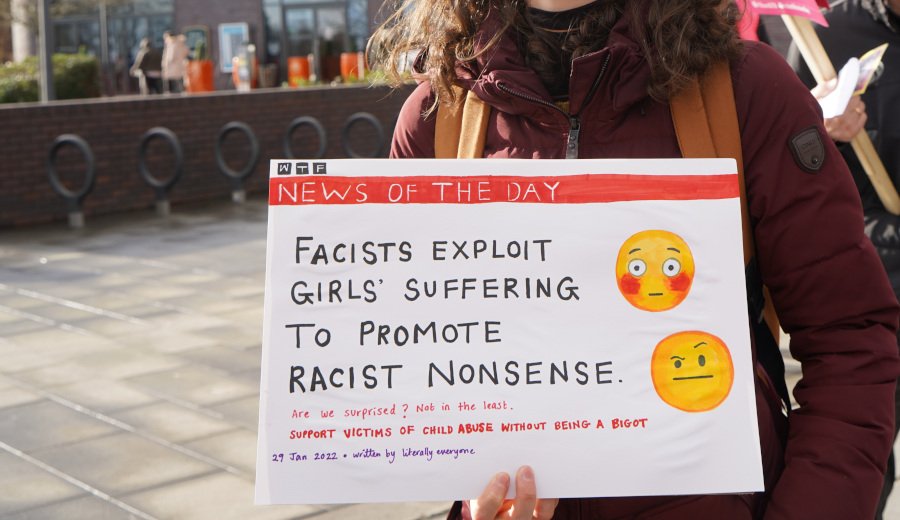Women Against the Far Right launches to counter anti-immigration protests

Written by NADJA editors
Photo by Callum Darragh / Creative licence

Women MPs, cultural figures and women’s rights campaigners in the UK have launched ‘Women Against the Far Right’ in response to claims that violence against women is linked to people seeking asylum. The allegations, fuelled by politicians and far right activists, have led to a wave of anti-immigration protests throughout the country.
At the campaign’s online launch event organised by Stand Up To Racism, Labour MP Bell Ribeiro-Addy said, “I don’t recall the far right marching outside police stations after a serving, white police officer kidnapped, raped and murdered Sarah Everard.
“It seems their concern is only for victims of violence against women and girls when the perpetrator is a person of colour.”
An open letter signed by more than 100 prominent women and campaigners said that, “Violence against women and girls is a serious and urgent issue. But it will never be solved by the likes of Nigel Farage and Robert Jenrick targeting refugees, Muslims and migrants.”
The letter’s signatories include artists Paloma Faith, Shirley Manson and Charlotte Church, and politicians Diane Abbott, Nadia Whittome and Zarah Sultana.
A backdrop of anti-immigration tension
In July, Hadush Kebatu, from Ethiopia, was arrested for sexually assaulting two teenage girls in Epping, a town in Essex. Kebatu, who is seeking asylum and was being housed in a hotel in Epping, has since been found guilty and will be sentenced later this month.
Following the arrest, politicians including leader of Reform UK, Nigel Farage, and shadow justice secretary Robert Jenrick, claimed that government immigration policies are to blame for a rise in sexual offences, with Jenrick saying that people with “medieval attitudes” coming to Britain meant he was afraid for the safety of his three daughters.
The remarks sparked protests that began outside the hotel, before spreading across parts of the UK including London, Bristol, Birmingham, Manchester, County Antrim in Northern Ireland and Perth in Scotland. Demonstrators carried signs saying ‘Protect our kids’ and ‘Save our girls’.
Tensions against migrants have been rising in recent years, with protests at times turning violent. In the summer of 2024, false claims spread online about the ethnicity and religion of the killer of three schoolgirls in Stockport, leading to rallies where more than 1,800 people were arrested.
The latest demonstration – labelled “Unite the Kingdom” – took place in London on Saturday 13th, led by far-right activist Tommy Robinson. The Metropolitan Police has said more than 110,000 people attended, a larger number than they or the organisers expected, and that 26 officers were assaulted with “kicks and punches” as well as “bottles, flares and other projectiles … and concerted attempts were made to get past barriers”.
The Met also had to respond to false suggestions by Grok’s chatbot that it had passed off footage from a 2020 anti-lockdown protest that shows police clashing with crowds as being from Saturday’s rally – allegations that were then repeated by X users, including prominent Daily Telegraph journalist Allison Pearson.
“No evidence” of increased links to sexual violence
Politicians and far right activists have repeatedly used exaggerated or misleading statistics to claim that immigrants are to blame for a rise in sexual violence. These claims have often been amplified on social media as well as the press.
Women Against the Far Right’s open letter states that, “There is no evidence that people seeking refuge are more likely to commit acts of sexual violence. Many are themselves survivors of violence, war, and persecution. Blaming them distracts from tackling the deep-rooted causes of abuse and from holding those truly responsible to account.
“The far right have seized on the lies, spread misinformation, and mobilised protests outside hotels housing refugees—including women and children. This does nothing to make women safer.”
It concludes: “The truth is that sexual violence is endemic across society and far too often ignored by those in power. Public services for women, children, victims and survivors have been cut to the bone, and too many cases are left without justice.
“We believe in a society where all women are safe, supported, and free from abuse — regardless of their background or where they come from. Standing up for women’s rights means rejecting racism and division, and building unity to demand real action to end violence against women and girls.”

READ MORE

Appreciate the thorough breakdown. This is high-quality content.